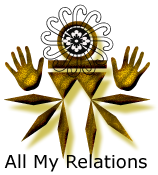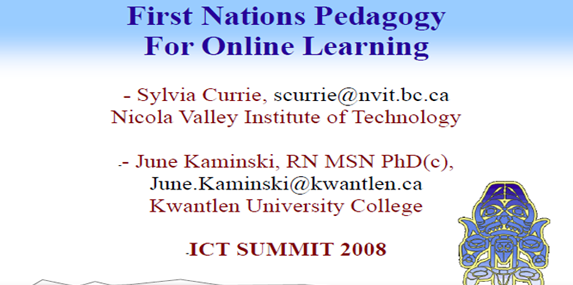First Nations Pedagogy for Online Learning
by © 2008 ~ June Kaminski, MSN PhD(c) with Sylvia Currie
Workshop presented at 2008 ICT Summit: First Nation Technology Council Conference, February 22nd, 2008, Vancouver, BC.
Also presented at Seeing Ourselves in the Mirror: Giving Life to Learning, Aboriginal Learning Knowledge Centre Conference, March 1, 2008, Vancouver, BC.
 Background
Background
This workshop presented our 3-phase BC Campus-funded project lead by Nicola Valley Institute of Technology in partnership with Kwantlen University College.
The project proposed to:
1) research best practices in developing and implementing online learning opportunities for aboriginal learners,
2) develop a resource website that will support these instructors and curriculum designers, and
3) support dialogue and sharing of ideas across institutions and community stakeholders.
First Nations Online Learning
Providing appropriate online content and learning strategies for First Nations students is challenging. We want to provide an accessible, comprehensive resource that provides direction and technique to all teachers across province and beyond. There is a need to explore and incorporate Pre-Colonial and First Nations situated Pedagogy into online course design and delivery. We also need to propose teaching and learning strategies that meet First Nation student needs and that fit the online environment.
Purpose of this Workshop
This workshop addressed the first phase of the project: best practices. Working with workshop participants we explored effective instructional strategies and essential elements of an online course that ensure success for Aboriginal learners
What do we mean when we say First Nations Pedagogy? Although the notion of Pedagogy is essentially Colonial or Eurocentric in origin, it can be used to draw well-deserved attention to the distinct and noteworthy ways that Pre-Colonial education was offered and engaged in. Distinct practices used for millennia to teach both 'theory' and hands-on practical knowledge were repressed and banned during Colonization, yet the methods have endured and are both unique and extremely valuable in the 21st century
Value of First Nation Pedagogy
Online content that is designed using First Nations Pedagogy methods is not only valuable for aboriginal students - it would be very powerful to teach ALL students in this way BUT all aboriginal students have the legal right to be taught using these methods, no matter what educational context they are studying in. In fact, the efforts to afford a liberal education for all university students is a mere whisper of the potential that First Nations pedagogy promises: a well rounded, holistic, intelligent professional.
Pre-Colonial educational approaches are profoundly different from those of the current mainstream educational system . Holistic (physical, mental, spiritual, emotional) growth and development of the person, Experiential learning, Oral tradition, and Student-centeredness are key elements of the First Nations pedagogical approach Further, and of vital importance, is the fact that it is grounded in Spirituality.
As most people are aware, mass media can be used as a vehicle for both social change AND for maintaining the status quo. Mass media is any method of communication that reaches large groups of people quickly and effectively, thus many means of communication can be considered 'mass media'. Television, radio, print media (magazines, newspapers, journals, pamphlets, flyers, books, letters, etc.), the world wide web, email, chat rooms, advertising, marketing, publicity, photography, documentaries, video, even theatre, movies, songs, dance, art, storytelling, and so on can all be categorized as media that can be used as a medium for social change and justice. The central criteria is that any of these mediums can be used to get messages out to thousands, even millions of people.
References
Battiste, M. (2002) Indigenous knowledge and pedagogy in First Nations education: A literature review with recommendations. Indian and Northern Affairs Canada.
Kirkness, V. J. and R. Barnhardt (2001). First Nations and Higher Education: The Four R's - Respect, Relevance, Reciprocity, Responsibility. Knowledge Across Cultures: A Contribution to Dialogue Among Civilizations. R. Hayoe and J. Pan. Hong Kong, Comparative Education Research Centre, The University of Hong Kong.
Pitawanakwat, J. Informal learning culture through the life course: Initiatives in Native organizations and communities. New Approaches to Lifelong Learning Working Paper #40-2001.
For more information you can visit First Nations Pedagogy at: https://firstnationspedagogy.ca
Portfolio Menu
One of the key distinctions of mass media is that it can affect people's perceptions of social norms. The media play a significant role in forming and influencing people's attitudes and behaviour. Media has a central role in mediating information and forming public opinion. The media casts an eye on events that few people directly experience and renders remote happenings observable and meaningful. It is important that nursing education applies the examination and the creative design of media that can influence the health of Canadians, to prepare nursing students to become active change agents and social justice initiators. The application of information and communication technologies provides a viable and meaningful way to achieve this goal. Further work is needed at a national and provincial level to help educators use technologies to support them to weave social justice and change agent abilities and knowledge into the Canadian nursing curriculum.
















